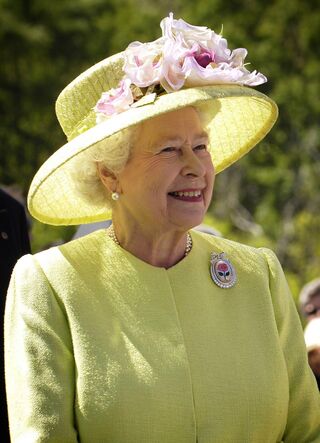Media
Gay Men on Saying Goodbye to Queen Elizabeth
Personal Perspective: Her death touched millions, but maybe especially gay men.
Posted September 10, 2022 Reviewed by Vanessa Lancaster
The world has lost a mother figure, Queen Elizabeth II. As happens with many public figures, the world mourns, and as we mourn collectively, there is something even more palpable for certain people—gay men—about losing her.

Queen Elizabeth has been an object of constancy for all of us over the past 70 years. She has held a special mystique, partially based on her formality and pomp and circumstance, but also based on her ability to address topics while not revealing her inner thoughts or feelings.
We could feel connected to her, but without truly knowing her, and so naturally, we could project who we thought she was or wanted her to be upon her.
For many, if not most of us, she has represented a mother or grandmother, a connection we might not have realized was there until her death highlighted it. Sometimes the loss of an important person helps us realize just what significance they hold for us; more often than not, when this happens, we wish we’d been paying more attention sooner. In this case, maybe the awareness of why we are all grieving as much as we are will serve as a comfort, especially in knowing we are not alone.
Saying Goodbye
On the day of her death, Thursday, I was struck by the variety of social media posts I read. Usually, when a public figure dies, there are a few photos of that person shared on social media, frequently the exact same images. But this time, there were hardly any duplicates. People went out of their way to post interesting photos of the queen across her life span, in various outfits, with family, while serving duty, posing with her various dogs, driving the Range Rover, and always nicely outfitted with her trusty handbag resting in the crook of her elbow. Looking at these various images reminded me of looking at a montage of family photos shared at a memorial, something done by various media outlets as well as via social media.
Part of this mystique of this “perfect” mother or grandmother figure is because Elizabeth was idealized: she was older, wise, formal, restrained, and all-knowing. That allowed us to connect to this figure in a less conflicted way than we connect with our real mothers and grandmothers, where the stakes of satisfaction and failure are higher. We relied on her constancy—her steadfast elegance delivered a sense of safety we get—when we’re lucky— from earlier generations of our own families. The comfort of these ancestors’ love and acceptance helped us internalize a positive view of ourselves and how to be in the world. Queen Elizabeth did that for us.
She was a mother to many, the kind of mother many of us wouldn’t actually want in our real lives, but one that afforded the maternal feeling without any of its complications.
Elizabeth’s Mystique for Gay Men
I spent the day on Thursday absorbing as many media portrayals of her life and death as I could while also wondering why her mystique has always been so powerful among gay men. A couple of my gay friends on social media posted hourly photos of her taken throughout her life span, letting their friends and followers know just how important she had been to them. I was kind of relieved to tell the truth. I’d wondered if more men would complain that she hadn’t been “direct enough” about important subjects, like gay rights, Princess Diana, her son Andrew’s myriad issues, her grandson Harry’s withdrawal from royal duties, Brexit, and so on.
She wasn’t perfect, but I enjoyed seeing how she was respected by so many of my gay friends and colleagues. But why?
Here is what I came up with.
Growing up, gay boys have needed to conceal themselves based on the risk of being rejected or humiliated. Therefore, being attuned to societal and emotional constraints evokes familiarity—or even respect.
Also, gay boys have a certain aesthetic different from that of other boys, something frequently described as innate—so for gay men, a particular elegance and style have its own automatic draw.
I described the pomp and circumstance that was how the queen held and shared herself in the world, and gay men are drawn to the predictability and safety of ritual, as well as to a degree of formality that can also help them hide behind a façade.
My nonprofit organization, Gay Sons & Mothers, examines the connections between gay men and the older women in their lives, and the dynamics I observed around Elizabeth’s death are very close to those we see when a gay man loses a beloved mother, aunt, or grandmother. These are the women who enable us to find ourselves, to choose a path forward, and who support and love us unconditionally.
There too, is a parallel” Elizabeth must have been disappointed with her country and its people many, many times in her life. But she never showed any disappointment. She loved her country and its people, and she encouraged them to be their best, even when she covertly found their decisions baffling.
When I think about the myriad stories and descriptions that gay men have used in describing their mothers, it is clear that many boys would have wished for a mom who was less cruel, critical, and more restrained about her reaction to his being different. Elizabeth was that mother, not just to her own four children, but to Great Britain and the Commonwealth, and indeed to the world. And maybe especially to gay men.
The Netflix series The Queen has helped us get to know her even better, to see her own struggles and heartaches and family issues. She was handed a huge responsibility while just in her twenties and reigned for seven decades through traumatic and tumultuous times with a balance of tradition and modernity.
I mentioned earlier what we projected onto her. Maybe she imbued an acceptance, at least in her demeanor and smile, that nourished those of us who grew up feeling so out of place in the world, doing it in a way that was quiet and didn’t draw too much attention to us. Being recognized for her friendliness was all we needed to feel special. And as the world mourns the loss of this important matriarch, we mourn as well, grieving the loss of that sense of protection she gave us.
An Imperfect Role Model
Elizabeth was an imperfect human–much the same as all of us. She was handed an empire upon which the sun was already starting to set, and many feel she did not work quickly enough to loosen its grip on the countries it had dominated. She nearly lost the support of many of her subjects when her response to the untimely death of Princess Diana did not initially rise to expectations. Her husband often publicly espoused racist and misogynist views.
But we accept those lapses in the same way a loving mother accepts the lapses in her beloved children—the way the queen herself accepted the lapses of her government and her nation. We can learn so much from her calm, her serenity, and her dignity. Perhaps gay boys would find the world a less hostile environment if more of the world followed her example.
And so, we mourn. Rest in peace, Queen Elizabeth. And thank you.




